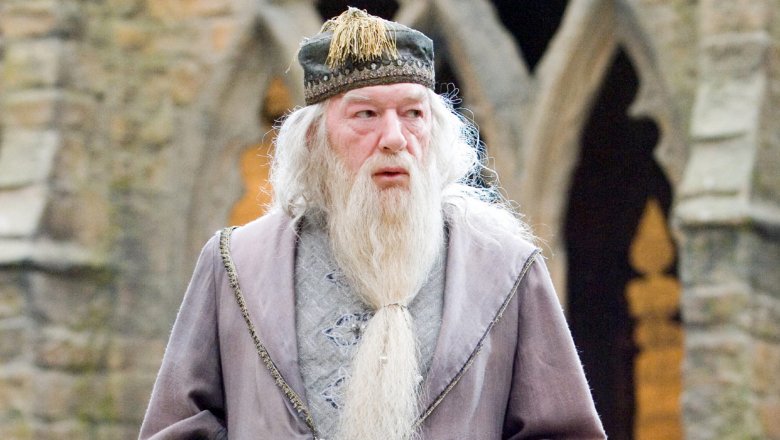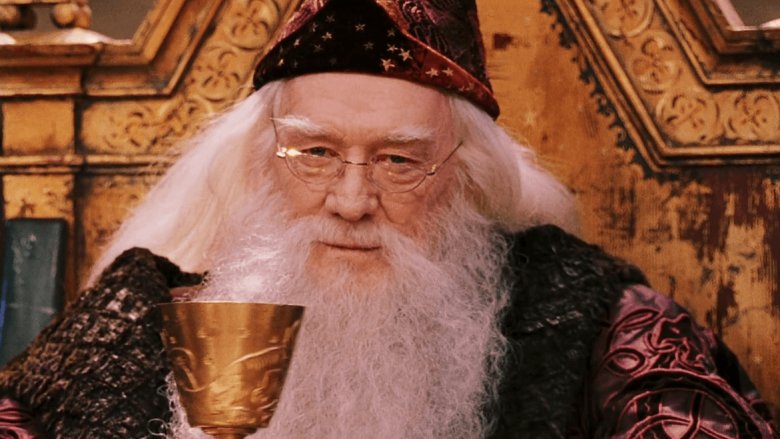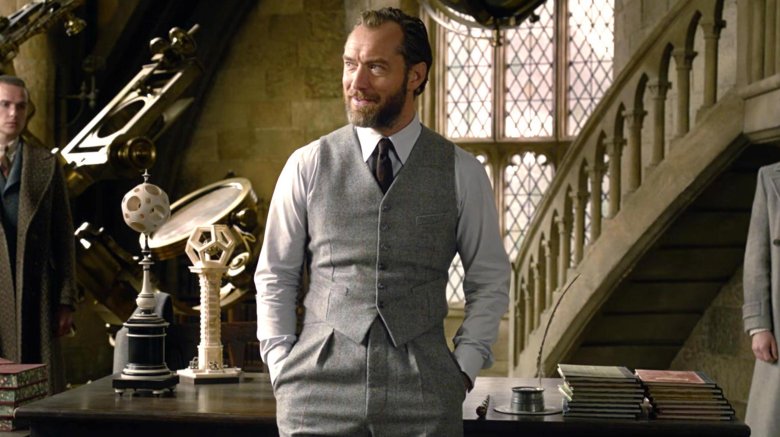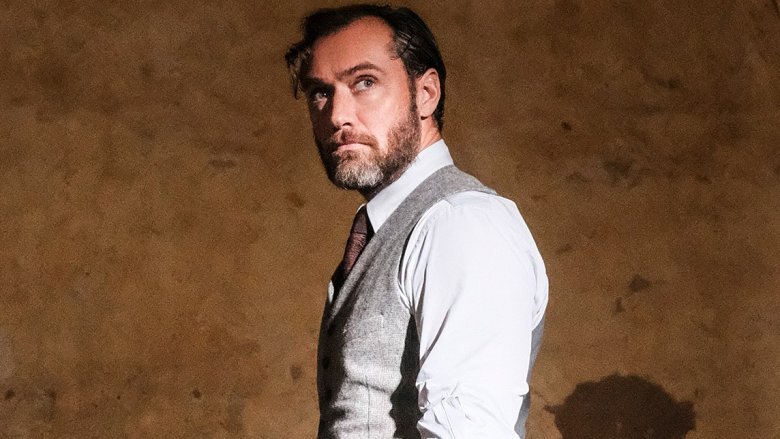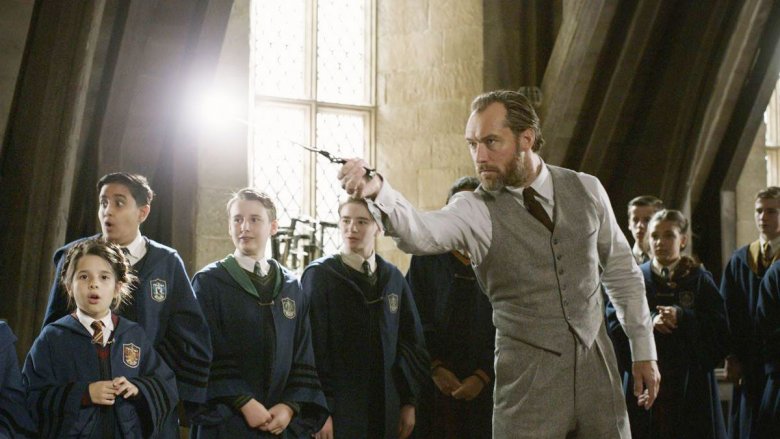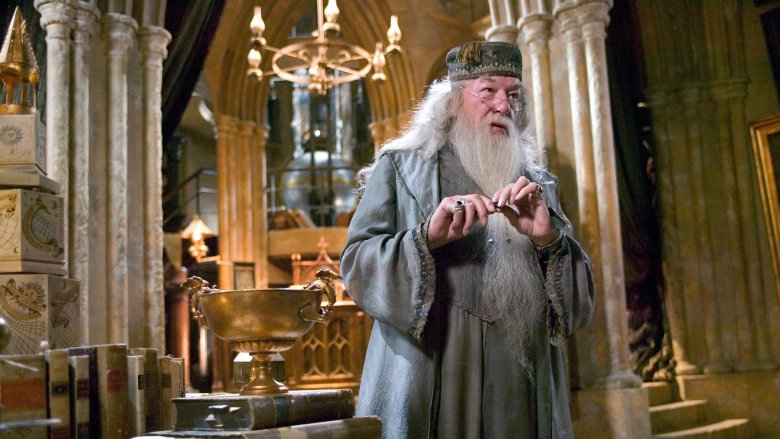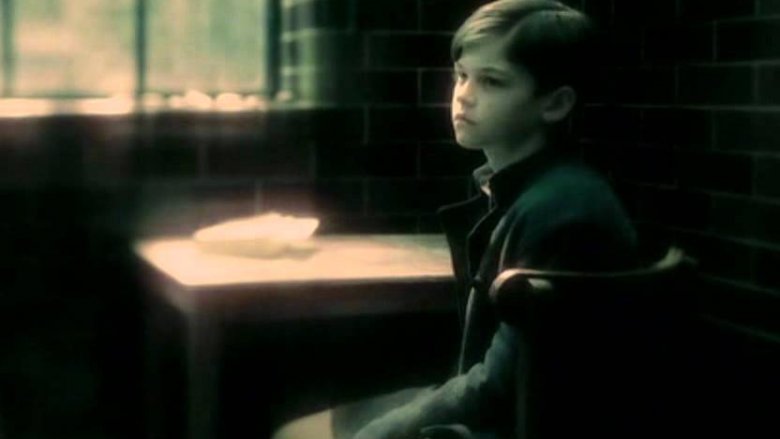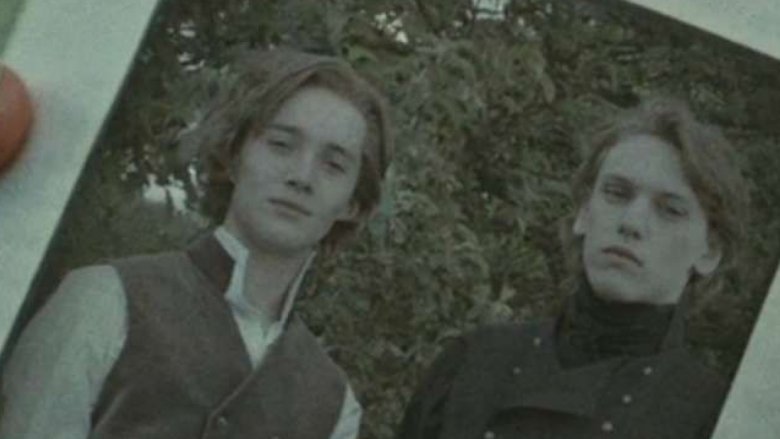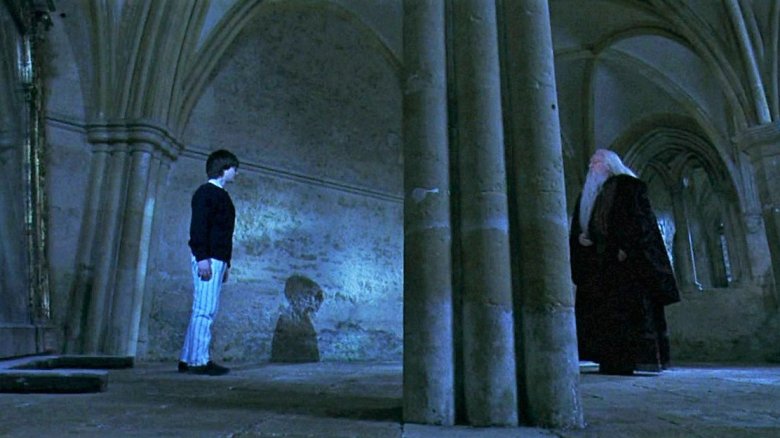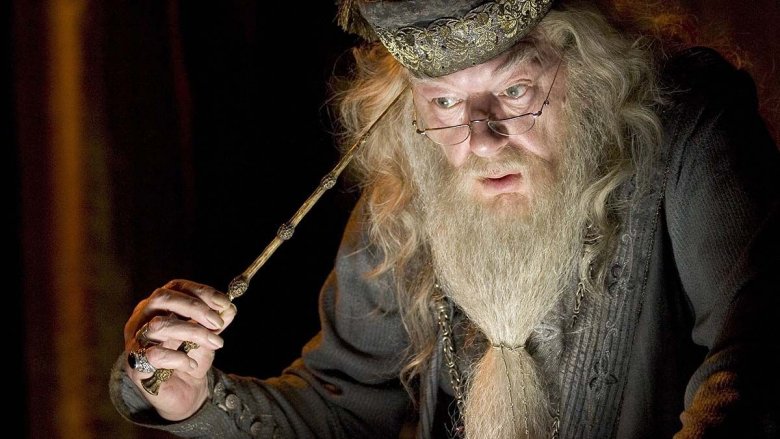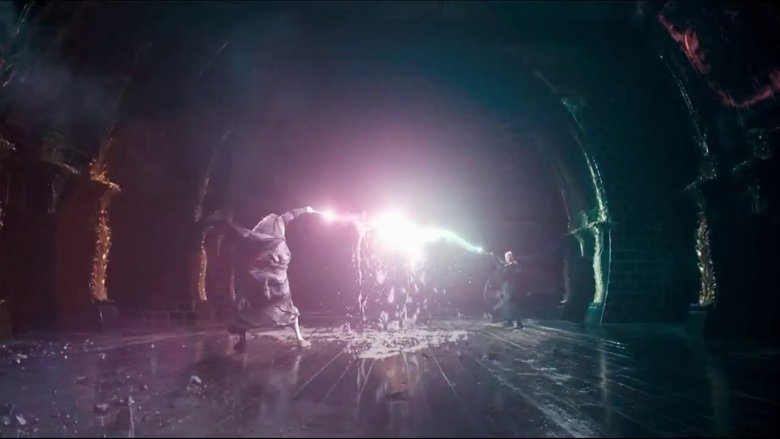Dumbledore's Backstory Explained
Since it first hit shelves in 1997, the Harry Potter book series written by J.K. Rowling has become one of the most popular and beloved franchises in pop culture history, spawning an inevitable adaptation of films, theme parks, candies, tons of merchandise, a spinoff film series, and even an award-winning Broadway show. The Potter phenomenon has become a major part of the international cultural landscape, inspiring readers and moviegoers of all ages after starting out as the "little book that could."
The series is home to a huge host of unforgettable characters, including Harry himself, his best friends Ron and Hermione, Harry's eternal nemesis Voldemort, Death Eater turned double agent Severus Snape, the entire Weasley family, and of course, Albus Dumbledore, the series' resident wizened wizard figure. A father figure to orphaned Harry, Dumbledore — who was played by Richard Harris and Michael Gambon in the original films after the former passed away during the franchise's run, then later Jude Law in the Fantastic Beasts films — serves as the emotional, intellectual, and moral center of the series, guiding Harry even when it seems impossible. If you've always wanted to find out about this legendary Potter wizard, here's your chance — here, we'll explain Dumbledore's backstory, talents, and timeline throughout the series.
Who was Albus Dumbledore?
Albus Percival Wulfric Brian Dumbledore was born in 1881 to Percival and Kendra Dumbledore, residing in Godric's Hollow (the ancestral home of Godric Gryffindor, where the Potter family would later live and die as well). Considered to be one of the greatest and most powerful wizards in history, Dumbledore was known for his distinctive long white beard, half-moon glasses, and whimsical attitude; when fans first meet him, he's cracking jokes about auspicious scars and offering up lemon drop candies like a kindly grandfather, and throughout Harry's relationship with his professor and mentor, Dumbledore can often be inscrutable, funny, and intentionally vague.
However, at the end of Harry Potter and the Half-Blood Prince, Harry's relationship with Dumbledore is cut unexpectedly short when he is killed at the hands of Severus Snape while Harry watches, helpless. Though there's more at play than he realizes in the moment, Harry is horrified as he watches one of his only parental figures fall to his death in June of 1997, which would make Dumbledore a whopping 116 years old when he died. Aside from a terminal illness caused by a cursed ring, Dumbledore seemed in great health during the rest of the series, so even at that advanced age, it's easy to surmise that he could have lived even longer otherwise.
Dumbledore's younger years
During his time as a Hogwarts student before he ascended to his future glory, Dumbledore was in Gryffindor House, one of the four houses into which students are sorted upon their arrival at the school when they're just 11 years old. Gryffindor, alongside Slytherin, Ravenclaw, and Hufflepuff, represents four different factions of the school. Typically, brave students are placed in Gryffindor; cunning kids end up in Slytherin; hard workers head to Hufflepuff; and the smartest find their home in Ravenclaw. Though Dumbledore certainly contains multitudes, it's no surprise that he ends up in Gryffindor, even though it's possible he was a serious Ravenclaw contender.
However, the most controversial element of Dumbledore's youth is undoubtedly his close personal friendship with Gellert Grindelwald, a story that Harry and the audience only discover during Deathly Hallows. After Dumbledore's death, a tell-all book about his life is published by toxic reporter Rita Skeeter, and though she takes some liberties when it comes to Dumbledore, he really was friends with Grindelwald, a fact many didn't know that cast a rare negative light on Dumbledore's life and legacy.
Dumbledore's big post-Hogwarts plans
In the wake of Dumbledore's passing, much is written about the venerated wizard, including a touching personal obituary penned by his Hogwarts classmate and longtime friend Elphias Doge for the wizarding newspaper The Daily Prophet. In it, he notes that Dumbledore planned to travel the world alongside Elphias after their graduation, but the death of Dumbledore's mother Kendra halted those plans.
Alongside his brother Aberforth, Dumbledore was left to care for their younger sister Ariana, who suffered from childhood abuse at the hands of young boys who lived near Godric's Hollow that caused magic to randomly burst out of her, uncontrolled. Unfortunately, these outbursts could be dangerous, and when Kendra was left to manage her daughter alone after her husband Percival went to prison for attacking Ariana's abusers, she was the victim of Ariana's misplaced magic. She was accidentally killed by her own child, leaving her two older sons in charge of a sweet yet inadvertently dangerous girl unaware of her own power. However, keeping Ariana hidden led to nasty rumors about the Dumbledore family, with many believing that Ariana was a Squib (a child with no magical abilities born to a family of wizards), and that the proud family was too ashamed of her to allow her out in public.
Dumbledore's tragic fight
The less famous Dumbledore brother, Aberforth, who would later go on to face prosecution over practicing "inappropriate charms on a goat," resented his brother — and as he tells Harry in The Deathly Hallows, he always considered Albus to be high and mighty about his considerable intellect and talent. As Ariana's main caretaker, Aberforth watched as his brother made extravagant plans that had nothing to do with his family, but it was Albus' friendship with Grindelwald that created the biggest rift between the siblings.
When Grindelwald moved to Godric's Hollow as a teenager to live with his aunt Bathilda Bagshot (author of the famous A History of Magic and friend to Harry Potter's parents before their murder in 1981), he and Dumbledore struck up a fast friendship, plotting ways to make the wizarding world better. However, when Aberforth butted heads with Grindelwald, the latter cast the Cruciatus Curse on the former (an Unforgivable Curse that causes unbelievable pain). As they dueled, Ariana got in the middle of the fight, only to be killed by a stray spell.
Dumbledore's more modest career path
In the aftermath of Ariana's tragic death, Dumbledore's need for power wholly abated — as he later told Harry, he didn't think he should be trusted with power after his friendship with Grindelwald ruined his family. Turning down repeated offers to take the ultimate seat of power and become Minister for Magic, Dumbledore turned instead to his true love: teaching.
As one of the most intelligent and learned wizards in history, it makes sense that Dumbledore would want to share his wisdom with young witches and wizards, and he returned to teach both Defense Against the Dark Arts and Transfiguration throughout his early tenure at Hogwarts School of Witchcraft and Wizardry. As the Transfiguration teacher, Dumbledore encountered a curious young student named Tom Riddle, whom he immediately recognized as a talented yet foreboding presence. Of course, that student would grow up to become Lord Voldemort, Dumbledore's biggest adversary besides Grindelwald.
How Dumbledore saw through Tom Riddle's facade
Before he fully became Voldemort, many who knew Tom Riddle saw him as a bright, kind, and thoughtful student who was simply desperate to prove himself, Dumbledore, who knew Riddle was capable of great cruelty and vindictiveness from an early age, was always wary of the young wizard. Immediately after Riddle graduated, he applied for the post of Defense Against the Dark Arts professor and was turned down, and when he tried a second time, Dumbledore rebuffed him yet again.
Already on his way to becoming Lord Voldemort — by the time he asked Dumbledore for a job, he'd already created at least one of his soul-carrying Horcruxes (if not more), which can only be crafted by committing murder — Tom told Dumbledore that he wanted to pass his storied knowledge onto Hogwarts students, but it was obvious that Dumbledore had some idea of the kind of magic the future Voldemort would end up teaching, and he refused. In that moment, Dumbledore sealed the fate of the entire position: as he later pointed out to Harry, Voldemort jinxed the post, as no Defense Against the Dark Arts professor ever stayed for more than one year after that fateful meeting.
Dumbledore's great lost love
Dumbledore's teenage friendship with Grindelwald was actually a little more than he bargained for initially; the two were secretly in a relationship, though J.K. Rowling has explained that Dumbledore's strong feelings may not have been fully reciprocated when she announced, after the books ended, that Dumbledore was actually gay.
The great tragedy of Dumbledore's sexuality is that he seemingly never got the chance to live his truth and express himself in any healthy relationship. Though the two carried on a very physical affair, Dumbledore had to come face to face with the man he loved and overcome him once and for all. In the 1940s, Dumbledore dueled Grindelwald, ending a wizarding war and taking down a wizard who turned out to be the face of ultimate evil (until Voldemort, that is). In the wake of Grindelwald's defeat, Dumbledore ascended to the position of headmaster at Hogwarts. Rowling later said, "He lost his moral compass completely when he fell in love and I think subsequently became very mistrustful of his own judgement in those matters so became quite asexual. He led a celibate and a bookish life."
Dumbledore's life of regrets
Aberforth may have been angry at his brother, believing that he never truly cared about what happened to his mother and sister or about the rift between the two siblings, but that couldn't have been further from the truth. Beyond eschewing an important Ministry of Magic job and flying relatively under the radar, Dumbledore lived with momentous regrets about his loved ones.
During Sorcerer's Stone, when Harry discovers the Mirror of Erised — a mirror that shows your deepest desire — he asks Dumbledore what the elder wizard sees in the mirror, and Dumbledore responds that he sees "socks," a gift he always wants for Christmas, but Harry gets the feeling that Dumbledore may not have been telling the truth. Later, when the two are trying to procure one of Voldemort's Horcruxes from a secret cave, Dumbledore drinks a potion to unearth the horrible magical item, screaming to Harry to hurt him rather than "them." As Harry later tells Aberforth, it was clear that Dumbledore was a haunted man, and the "them" he was crying out for was his lost family.
Dumbledore and the Elder Wand
Despite the fact that he pathologically avoided gaining too much power, Dumbledore did allow himself to buy into one myth and take control of one of the most magically powerful artifacts of all time. In the final installment of the series, Harry, Ron, and Hermione learn about the eponymous Deathly Hallows, a legendary trio of items made up of the Invisibility Cloak, the Resurrection Stone, and the Elder Wand. Harry has owned the Invisibility Cloak all along, but the Resurrection Stone and the Elder Wand belonged to another — specifically, Dumbledore.
In order to try and bring his family back, Dumbledore tried to break into a cursed ring of Voldemort's to retrieve the Stone and ended up inflicted with a fatal curse, but he maintained possession of the Elder Wand after his duel with Grindelwald. Since he knew that Voldemort would stop at nothing to get the world's most powerful wand, he arranged his own death at Snape's hands, finessing the ownership of the wand until it would fall to Draco Malfoy, a young boy tasked to murder Dumbledore by Voldemort himself. In the end, Harry ends up the master of the wand, but it's still a pretty incredible feat on Dumbledore's part to not only hide the wand from evil for so long, but even make sure that it would never truly work for Voldemort's purposes.
Dumbledore's greatest powers
Throughout the series, Dumbledore is the wisest and sagest character of all, advising everybody on everything from deep and powerful magic to matters of the heart. Beyond his kindness and generosity, Dumbledore was also imbued with particular magical skill, and his list of accomplishments and talents seems never-ending.
A skilled Occlumens (which means he could see into others' minds) and Legilimens (which means he was able to block others from seeing into his mind), Dumbledore could conjure everlasting Gubraithian fire and make himself invisible without a magical cloak, and was a master at all magical duels, fighting everyone from Grindelwald to Voldemort. He was also an accomplished alchemist who helped create the Sorcerer's Stone with Nicolas Flamel, which can turn any item to gold and promises eternal life, as well as discovering all 12 uses for dragon's blood. On top of all of that, he spoke multiple languages, including Mermish, though it's never known how or why he learned it. Finally, and most importantly of all, his knowledge of and belief in the power of love as it pertains to magic and protection was unparalleled — in fact, it was just that knowledge and belief that eventually helped Harry topple Voldemort.
